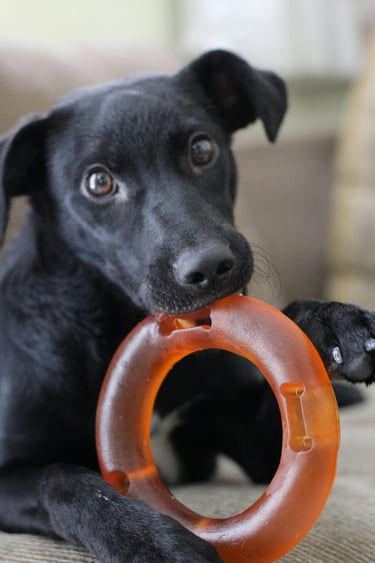Essential Training: Alone Time, Chewing, and Potty Success. Part 4
Master the fundamentals of alone training, managing chewing, and achieving potty training success for a harmonious household.
9/3/20252 min read


Three common areas where new puppy owners often seek guidance are teaching their dog to be comfortable alone, managing chewing, and successful toilet training. Mastering these foundational behaviors is crucial for a harmonious household and a well-adjusted dog.
Alone Training: Fostering Independence
It's natural to want to spend every moment with your new puppy, but eventually, they'll need to be comfortable being left alone. Overlooking alone training can lead to stress, destructiveness, excessive barking, or even separation anxiety.
The key is to teach your dog that your leaving is nothing to worry about and can actually lead to pleasant things (like special treats or toys in their favorite spot). Always ensure your puppy is in a safe, puppy-proofed room or crate with:
Nothing to jump from or that could be harmful if chewed.
A comfortable blanket and access to water.
A designated spot for elimination away from their sleeping area.
Start with very short intervals (leave the puppy alone while you’re showering, doing an activity in another room) and then gradually increase the duration (30-60 minutes for 8-10 week old puppies). Engage your dog with exercise or play before you leave, then depart calmly. Your relaxed demeanor signals to your dog that everything is fine.
Decoding and Managing Chewing
Chewing is a natural and necessary dog behavior that releases feel-good neurotransmitters. Always provide plenty of age-appropriate chew toys and treats. However, excessive chewing – think destroyed furniture or shoes – often indicates an underlying issue and can be dangerous for your dog.
Here are common reasons for excessive chewing:
Separation Anxiety: Your dog isn't comfortable being alone. Address this with gradual alone training.
Teething: Puppies (3-7 months) chew to relieve discomfort from new teeth. This is normal. Offer appropriate chew toys, even frozen ones.
Hunger: Ensure you're feeding the right amount of age and breed-appropriate food, and with all the nutrients your puppy needs, ideally over multiple meals.
Boredom: A lack of physical exercise and mental stimulation can lead to destructive chewing. Increase walks, playtime, and provide puzzle toys.
Anxiety/Frustration: Some dogs chew to self-soothe in stressful situations. Identify triggers and train calming behaviors.
If you've addressed these possibilities and excessive chewing persists, it's wise to consult your vet or a professional dog behaviorist.
Toilet Training: Patience and Consistency
Puppies gain bladder control around 4 months, but the ability to "hold it" until reaching a designated spot must be taught. Consistency is paramount!
Immediate Action: As soon as you bring your puppy home, take them to their designated outdoor elimination spot. Praise and reward them with a treat the moment they go.
Frequent Outings: Repeat this every 1-2 hours, and especially after waking up (day or night), after meals, and after play sessions.
Nighttime Cues: If crated, ensure you can hear them if they need to go out.
Crucially, NEVER punish your puppy for accidents. Simply take them to their designated spot, clean the accident area thoroughly with an odor-eliminating cleaner, and adjust your timing for the next outing. Patience and positive reinforcement are your best friends in toilet training!
If you would like some extra advice and help from me, book a coaching session now.
078 234 8353 (WhatsApp)
